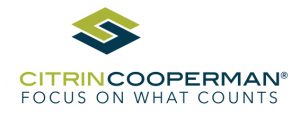The Importance of Cash Flow Forecasting in Uncertain Times
Businesses of every size and industry are feeling the impact of coronavirus (COVID-19) worldwide. The uncertainty that has followed the global pandemic has placed an increased level of importance on forecasting so that companies can meet the future needs of their business, or know as early as possible when and how to adjust their course if they think they may not be able to do so.
Given the uncertain status of the U.S. and global economies, it is highly recommended that all businesses prepare and continually update their thirteen-week cash flow projections. It is as equally important for businesses with good cash flow as it is for those businesses facing cash shortages resulting from the impact of the pandemic. Businesses with excess cash flow may seek to invest excess cash or otherwise redeploy it to help the business. Businesses with cash shortages need to know where and when they will occur, so they can avoid or mitigate the shortage.
A cash flow model can be simple or complex; it depends on how complex a cash cycle is to meet the needs of the business.
A cash flow model can be simple or complex; it depends on how complex a cash cycle is to meet the needs of the business. As an example, inputs into the cash flow forecast for a manufacturing company would include expected collections from sales and other sources of cash, like a line of credit and cash outflows for items like inventory, debt payments, rent, payroll, insurance, and other operating costs. Done on a rolling thirteen-week basis, such an analysis, when prepared correctly and with the appropriate assumptions of cash collection and expenditure, can highlight periods where a business’s cash position is expected to be tight in the future. Your CPA or other business advisor can do a lot to assist your business in developing a model that works for you.
For companies with borrowing base calculations, which determine the availability of credit under revolving credit facilities, projecting out balances of inventory and accounts receivable – two common inputs of the borrowing base – are also extremely important on their own and as inputs to the cash flow forecast to determine what cash flow shortages can be covered by available credit. If your company is or was shut down for a period of time, it’s possible that cash collections have come in for invoices previously issued but no additional shipments have taken place. Additionally, businesses may find that vendors are seeking to formally or informally extend credit terms, where more accounts receivable may age-out of the borrowing base. In both of these scenarios, the accounts receivable balance eligible to be included in the borrowing base could be lower than normal levels, resulting in less available credit to meet working capital needs. At the same time, shut downs can also cause increases or decreases in inventory balance. If the inventory balance grows too high or old and ages out of the calculation, or if shipments continue to be made but new inventory is not purchased to replace it because vendors are closed, the inventory balance eligible for the borrowing base can shrink and reduce the credit available to a business under revolving credit facilities.
Click here to read more content from Citrin Cooperman
It’s extremely important to get out ahead of all of these issues and contact your banker and CPA. No one likes surprises of this nature, but with enough advanced planning, something might be done to help protect the business.
Cash flow is also an important input into many covenant calculations like the fixed coverage charge ratio. Impacts of the pandemic can effect certain elements of the calculation (like EBITA or cash flow from operations) and bring the ratio below the minimum allowed by your bank agreement. This is another item your bank will appreciate hearing about before it happens and your CPA or business advisor can assist you in getting ahead of it by preparing and updating a good thirteen week cash flow forecast.
The biggest takeaway here is the need for action. The businesses who make it to the other side of this pandemic will be the ones who took action, got ahead of potential issues, and found timely solutions by working regularly with their CPAs, business advisors, and lenders to avoid surprises.
Citrin Cooperman is a nationally recognized, full-service CPA firm, currently ranked in the U.S. top 25, with a dedicated manufacturing and distribution practice. The firm offers assurance, tax, and business advisory services to help clients remain competitive in today’s market.
COVID-19 Resources
To help our clients navigate through the myriad of challenges you are facing, Citrin Cooperman has developed a dedicated COVID-19 Response Unit (CRU) to be leveraged as a resource center. CRU contains up-to-date legislative developments, tax alerts, business guidance articles, recorded webinars, and more. Please check back often as we continue to update CRU with critical information.
 William Morrill is a director at Citrin Cooperman, with more than 9 years’ experience. He provides audit, financial reporting, and business consulting services to clients in various industries, with a strong focus on manufacturing and distribution companies.
William Morrill is a director at Citrin Cooperman, with more than 9 years’ experience. He provides audit, financial reporting, and business consulting services to clients in various industries, with a strong focus on manufacturing and distribution companies.
 10 Weybosset Street, Suite 700 | Providence, RI 02903 | 401-421-4800 | citrincooperman.com
10 Weybosset Street, Suite 700 | Providence, RI 02903 | 401-421-4800 | citrincooperman.com










